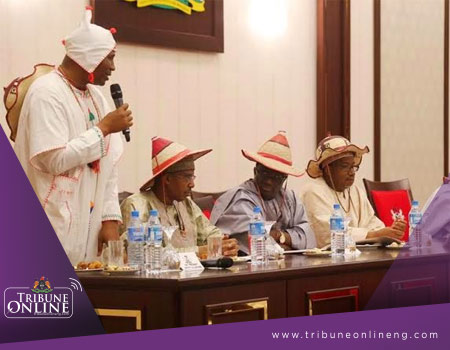The Miyetti Allah Cattle Breeders Association of Nigeria (MACBAN) have rejected the move by the Central Bank of Nigeria (CBN) to restrict Forex on milk importation.
MACBAN said this move will be counter-productive and would undermine the efforts already put in place by the government to improve the livestock sub-sector and resolve the lingering crisis between the herders and farmers.
MACBAN also said that the National Livestock Transformation Plan (NLTP) which was initiated by the government to improve livestock production should be strengthened.
The National Secretary of MACBAN Baba Othman Ngelzarma in a statement noted that the new CBN policy on milk and livestock excluded the Pastoralists and farmers, which he said was not proper.
According to him “the CBN governor, disclosed on Tuesday 23rd July 2019 at the end of the Monetary Policy Committee (MPC) meeting in Abuja, a planned policy restricting allocation of foreign exchange (FOREX) for milk importation into Nigeria. Although a desired long-term outcome where local production substitutes importation, implementation of such a policy requires a robust strategy that addresses underlying issues.
“MACBAN note that the National Livestock Transformation Plan (NLTP) is an integrated plan that holistically solves the historic challenges that have deprived the pastoralists from producing high quantity and quality beef and dairy products demanded by the Nigerian market, ensuring that their goods do not end up being sold at sub-standard prices.
“NLTP modernizes the industry through handholding the pastoralists and allowing ranches to develop organically with pastoralists as core participants in the Livestock production chain which will ultimately impact wealth creation and knowledge transfer mechanisms. This we strongly believe is a safer, more stable sustainable pathway than one which favours only one part of the Livestock system.
Ngelzarma explained “for MACBAN, partnership with domestic and foreign value chain actors is critical. Whether with fodder and pasture specialists at NAPRI, Zaria or dairy processors from Europe or cross-breeding specialists from Brazil or vaccine developers from NVRI, Vom in Jos, partnership across the livestock ecosystem is a requirement. Any plan that does not place such a step at its core is doomed to fail.
“Therefore, for MACBAN, the recent discussions between the Central Bank of Nigeria’s Development Finance Department and dairy processors is a non-starter. The challenge is not solved by lending money at 9% and requiring dairy companies to go to Kaduna, Niger, Plateau, Kano or Oyo to locate and develop at least 10,000 hectares of land within a grazing reserve commencing on or before September 2019.
“We believe Such approach does not speak to the aspirations of our members because without the Pastoralist crop farmers, processors, bankers, ranchers, technical workers, extension service providers, geneticists, and other stakeholders being involved, the likely hood of failure will be very high”.
MACBAN also kicked against the CBN’s proposal given to dairy processors to come up with their own plan on how they would develop their farms in the grazing reserve proposed to them by CBN at a 9 per cent interest rate.
Ngelzarma said “this move is disastrous on two counts: one, it disregards completely FGN approved NLTP that clearly outlines the necessary steps needed to be taken to transform the livestock subsector over 10 years in line with the desires and aspirations of all consulted stakeholders.
“Secondly, the need for FGN regulations and incentives for the roles of all partners in the transformation processes to achieve the goals of peaceful coexistence between crop farmers and pastoralists as well as enhancement of the pastoral productivity through organic modernization of the pastoral production base with capacity to retain their cultural livestock linkage in modernity and innovation for generations to come”.
He, however, advised the CBN to retrace its steps and take a productive role that does not undo the work done to date.
“As much as the infusion of capital into the livestock sub-sector is deeply appreciated and welcome, it must occur in the right strategic, stakeholder and cluster development context as provided in the NLTP framework.
“It is important that the spirit of partnership and transparent dialogue with which the NLTP was developed be maintained and allowed to thrive.
“Therefore, CBN should in all sincerity come to the table and join the all-inclusive reformist efforts underway under the NLTP rather than reinvent the wheel once again.
“Furthermore, Transforming Nigeria’s livestock sub-sector from a basic, subsistence low technology, conflict-stricken status into a world-class, productive, safe and profitable industry devoid of conflicts requires the involvement of all stakeholders including the pastoralists and crop farmers” Ngelzarma added.
He noted that there is a pilot project in Kachia Grazing Reserve in Kaduna State-funded by business innovation facility (BIF-UK AID) where a small scale dairy value change was set up and all the community within and around are participating and benefiting which at long run will resolve crisis between farmers and herders, create jobs for youth and women.
“Any plan that excludes the pastoralists and crop farmers, or does not solve what their essential challenges fall short of our expectations and support”, he said.
He highlighted some of their challenges to include “to upscale the pilot project of Kachia grazing reserve, access to a more stable availability of pasture and water, access to land upon which pasture and water are harnessed, creation of peaceful coexistence between them and their crop farmers based on mutual interdependence.
Access to capacity development for the pastoralists and crop farmers around the grazing reserves to enable them to modernise their current system of livestock production through pilot ranch modelling demonstration, access to a secure environment for their families with all the necessary education, health and other public-provided amenities necessary for the development of a modern, heterogeneous, prosperous and peaceful communities, livestock diseases control and management”
WATCH TOP VIDEOS FROM NIGERIAN TRIBUNE TV
- Let’s Talk About SELF-AWARENESS
- Is Your Confidence Mistaken for Pride? Let’s talk about it
- Is Etiquette About Perfection…Or Just Not Being Rude?
- Top Psychologist Reveal 3 Signs You’re Struggling With Imposter Syndrome
- Do You Pick Up Work-Related Calls at Midnight or Never? Let’s Talk About Boundaries






